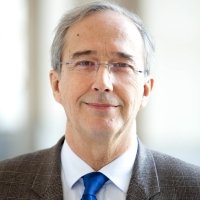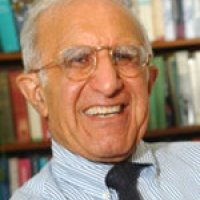Iran, the Next Five Years: Change or More of the Same?
Four Iran experts discussed Iran’s prospects for the next five years, possible new directions, and the challenges ahead as a result of President Hassan Rouhani’s election.
On March 26, 2014, the Middle East Program at the Woodrow Wilson Center held a meeting, “Iran, the Next Five Years: Change or More of the Same?” with Bernard Hourcade, Global Fellow, Wilson Center; and Senior Research Fellow Emeritus, Centre National de la Recherche Scientifique, Paris, France; Bijan Khajehpour, Managing Partner, Atieh International; Roberto Toscano, former Public Policy Scholar, Wilson Center; President, Intercultura Foundation; former Italian Ambassador to India, 2008-2010; and former Italian Ambassador to Iran, 2003-2008; and Robin Wright, Wilson Center-USIP Distinguished Scholar. Shaul Bakhash, Clarence J. Robinson Professor of History, George Mason University, moderated the event. Haleh Esfandiari, Director of the Middle East Program at the Wilson Center, provided opening remarks.
Bakhash opened the discussion by remarking that Iran is “once again at crossroads.” He indicated that despite what the skeptics had predicted, President Rouhani and his administration have begun to implement change in three main spheres: 1) reintegration of Iran with the international community; 2) opening up the economy to the private sector and foreign investment; and 3) opening up the society in the political sphere. Bakhash added that President Rouhani has chiefly focused on foreign relations and Iran’s nuclear negotiations, but that he has also spoken frequently about the need to open up the economy to the private sector and end the “security state.” He described this turn of events as a “very stark and striking change” in comparison with the former administration. He stressed, however, that he believes the hardline conservatives remain the strongest political body of power in Iran, suggesting that Rouhani faces serious obstacles.
Hourcade began by pointing out the importance of the next parliamentary elections in Iran. He stated that “in Iran, elections matter” and “official data can be used to decipher the political life in Iran.” According to Hourcade, the next Majlis elections may become “a political landmark.” He explained that President Rouhani’s election displays a new consensus between the right and the left in Iran, showing that both sides look for a “central solution” to take Iran out of the current deadlock. Regarding Iran’s nuclear issue, he said that finding a solution largely in the hands of the P5+1. However, he noted that the sustainability of any nuclear agreement will be “in the hands of the next Majlis,” which must ratify whatever agreement is reached. In his closing remarks, he explained that Iran may move in the direction of a form of nationalism combined with Islam, “which is open to the West but also supports the Iranian identity. All Iranians will be able to unite around this notion, with Supreme Leader Ayatollah Khamenei in the center creating a new consensus.
Khajehpour shared with the audience some economic indicators, pointing to the positive trends in the economy under the Rouhani administration. He said that Iran has emerged from the negative cycle of economic decline. Inflation is easing and the rial has stabilized. The most positive news is the increase of the trade surplus. Khajehpour named three main problems as defined by Iran’s Minister of Finance and Economy: high inflation, a high unemployment rate, and a large budget deficit. He added that Rouhani’s administration has been able to contain the inflation, but the circumstances are still far from favorable. He then referred to the decree issued by the Supreme Leader for the “resistance economy,” pointing out that, despite the rhetoric, this is a blueprint for economic liberalization. Khajehpour said that the trends are positive and predicted a steady GDP growth over the next five years of 3 to 5 percent. According to him, inflation will decline and stabilize at 10 to 15 percent, and unemployment and underemployment will also decline gradually. He concluded his discussion by saying that he believes Iran will not return to policies that led to the economic decline of the past few years.
Toscano began by saying that Iranians want their country to be a “normal” country, one that does not portray a negative image. He noted that in Iran today there is no hostility toward Americans, concluding that a policy of normalizing relations with the United States will not face domestic opposition. According to Toscano, those people who do oppose normalization do so for political, not cultural, reasons. He explained that Rouhani’s government is a coalition and covers a wide political spectrum. He described the men of the Rouhani government as among “the most liberal and progressive” Iranians in government, and this is a “proof of change.” Toscano also noted that the Supreme Leader has allowed change at different periods, although he has sought to contain such change when he has felt it was “getting out of control.” Toscano concluded his remarks by saying that things are already changing and what is certain is that “Iran will remain a very interesting country.”
Wright, who has recently returned from a trip to Iran, focused on signs of change in Iran’s foreign policy perspectives. She noted that while in the recent past Arab states of the region of feared what they saw as a rising “Shi’ite crescent, today the situation is different. Following the withdrawal of the United States from Iraq and its drawback in Afghanistan, it is Iran that feels “surrounded by a Salafi circle.” As a result, Iran does not consider the United States a threat anymore but, rather a country with which they “share some common national security concerns.” Wright said that “Iranians are looking well beyond their immediate circumstances.” Another reason that has caused a “strategic recalculation” in Iran is the troubled economy, which is characterized by “mismanagement, corruption, and a growing economic gap.” She also argued that Iran’s support for President Bashar al-Assad is a “tactical decision,” because Iran “believes it is strategically lonely.” Wright believes that after the nuclear issue is resolved, the next item on Iran’s agenda will be a focus on the Arab world. Iran is concerned and wishes to prevent the Shia-Sunni divide.
By the Middle East Program
Speakers

Senior Research Fellow Emeritus, Centre National de la Recherche Scientifique, Paris, France


Hosted By

Middle East Program
The Wilson Center’s Middle East Program serves as a crucial resource for the policymaking community and beyond, providing analyses and research that helps inform US foreign policymaking, stimulates public debate, and expands knowledge about issues in the wider Middle East and North Africa (MENA) region. Read more
